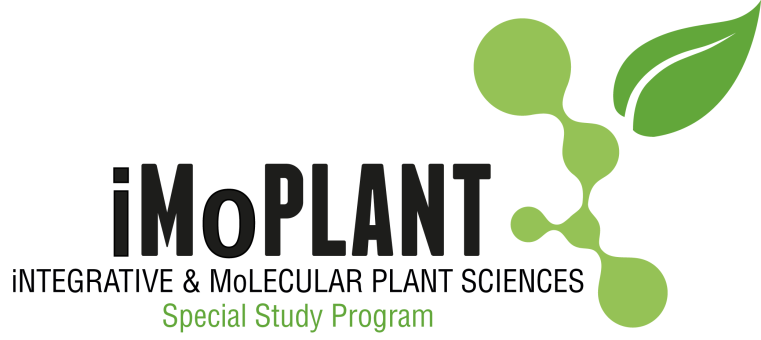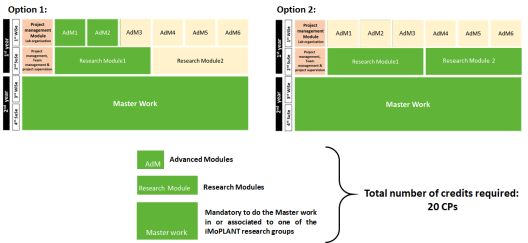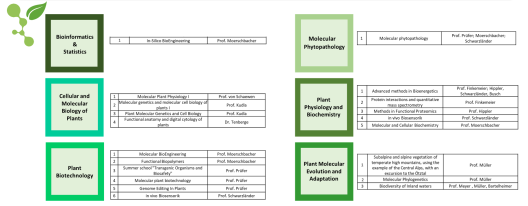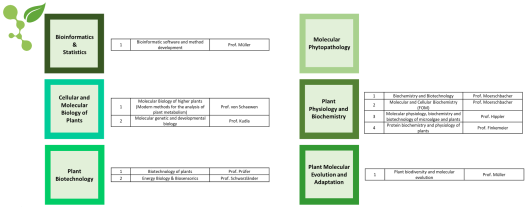

Overview
The Special Study Program (SSP) iNTEGRATIVE & MoLECULAR PLANT SCIENCES (iMoPLANT) is a new specialization offered within the Master program Biosciences.
Taking into account the overarching challenges that our society faces today, such as the preservation of biodiversity, environmental sustainability, production of renewable resources (like food, biomass for energy and biomaterials, and pharmaceuticals for medicine, among others), it is crucial that the next generation of plant scientists is aware of these problems and seeks possible solutions.
The SSP iMoPLANT covers a broad spectrum of scientific aspects in its program to ensure that students learn from a critical and practical perspective how plants work and what tools plant science can provide to solve the planet's urgent problems.
Within the SSP, we offer a broad variety of modules (marked with the iMoPLANT label) which students can choose from to learn state-of-the-art molecular, biotechnological, genomic and biosensing techniques. In addition, they will learn about technological advances in the field of functional mass spectrometry, genome editing as well as live cell imaging.
The SSP iMoPLANT program is aiming at students that are highly motivated to study Molecular Plant Sciences, seeking for an outstanding curriculum to be prepared for the future job market.Why Plant Biologists are important to society
Plants are fundamental for all aspects of life on earth. They provide us with renewable resources, like oxygen, food, energy and medicinal compounds. At the same time, plants are cornerstones of our ecosystems. Nowadays, we are experiencing new challenges, such as climate change, increasingly limited agriculture, disturbed ecosystems, and novel diseases that challenge crop production. Plant Sciences today are more important than ever, and will continue to be so in future!

© Uni MS - Dr. Maida Romera Branchat Hence, plant biologists are urgently needed to implement and improve a sustainable bioeconomy that protects species and ecosystems, ensures the global food supply and mitigates the effects of climate change based on a more sustainable agriculture.
The application of biotechnological advances together with increasingly solution-focused research is the basis of the iMoPLANT program. The iMoPLANT groups focus on understanding plant adaptation to stress from a molecular, metabolic and evolutionary perspective. They investigate plant evolution using phylogenetic approaches and plant adaptation to natural stresses, pollinators and herbicides for instance to improve weed management. In addition, their goal is to engineer biomass production by using biotechnological approaches in important crop species (like tomato, yam, etc.) as well as providing strategies to optimise photosynthesis by dissecting its molecular mechanisms in green algae and Arabidopsis as model organisms. Furthermore, functional biopolymers are adapted (such as fungal chitosans or natural rubber from a dandelion) for their therapeutic or biotechnological uses.
Focus Area "PLANTS"
The development of the SSP iMoPLANT is conducted by the research groups of the Faculty of Biology with a focus on “Plants”.
Currently, nine research groups are participating in the iMoPLANT program (listed by surname of the Professor/Principal Investigator, in alphabetical order):
- Plant Physiology: Prof. Dr. Iris Finkemeier
- Plant Biochemistry & Biotechnology: Prof. Dr. Michael Hippler
- Green Biotechnology: Prof. Dr. Till Ischebeck
- Molecular Genetics & Cell Biology of Plants: Prof. Dr. Jörg Kudla
- Molecular Phytopathology & Renewable Resources: Prof. Dr. Bruno Moerschbacher
- Evolution & Biodiversity of Plants: Prof. Dr. Kai Müller
- Plant Biotechnology: Prof. Dr. Dirk Prüfer
- Molecular Physiology of Plants: Prof. Dr. Antje von Schaewen
- Plant Energy Biology: Prof. Dr. Markus Schwarzländer
In addition, three junior research groups are also involved in the program:
- Establishment of yam as a potential crop in Europe: Dr. Janina Epping
- Seed germination & protein modifications: Dr. Guillaume Née
The research of the iMoPLANT groups follows innovative approaches in well-equipped laboratories and provides modern infrastructure.
All advanced modules and research modules offered by the iMoPLANT work groups are registered within the “Modulhandbuch” and marked with the “green” label.
For further information on specific courses, please visit the “Modulhandbuch”.
SSP Structure/Certificate/Flyer
The SSP iMoPLANT follows the structure of the MSc Biosciences program, which consist of six 4-weeks advance modules (AdM), two additional 8-weeks Research Modules (RM) during the first year, a Project Management Module plus a final Master thesis accompanied by supporting satellite modules during the second year.
Requirements to obtain the SSP iMoPLANT certificate:
To obtain the certificate it will be necessary to complete a total of 20 CPs in advanced modules and/or research modules with the "green" label.
Hence, students must select advanced modules and research modules by following one of the two options below:
OPTION 1: Choose 2 AdM (5 + 5 CPs) and 1 RM (10 CPs) with the "green" label .
or,
OPTION 2: Choose 2 RM (10 + 10 CPs) with the "green" label.
In addition, students will have to perform their Master Thesis (60 CPs) in (or associated with) one of the iMoPLANT research groups.
While it is not mandatory, it is recommended to chose a mentor from among the iMoPLANT-related groups, to discuss your interests and study plans for an optimal selection of modules. This does not have to be the head of the group where you will eventually do your Master research project.

© Uni MS- Dr. Maida Romera Branchat Within the the iMoPLANT program, SSP students will specialize in Integrative & Molecular Plant Sciences with flexibility in choosing additional courses that do not necessarily focus on Plants. This provides the possibility to create a broad-minded, individual, and unique research profile.
After completion of the SSP iMoPLANT program, students will receive an official certificate besides the degree in MSc Biosciences, showing that they received state-of-the-art training in Plant Sciences.For more information about the certificate, please click here.
The Flyer for the Special Study Program (SSP) iNTEGRATIVE and MoLECULAR PLANT SCIENCES (iMoPLANT) within the MSc study program Biosciences provides an overview of structure and content, as well as information on how to apply.
SSP Content
The new SSP iMoPLANT program integrates knowledge about plants from a broad perspective, en-compassing the molecular, cellular and organismic levels to understand how plants interact with their environment.
To ensure that SSP iMoPLANT teaching covers these goals, we designed a program that offers 6 core subjects of Integrative & Molecular Plant Sciences:
“Plant Physiology & Biochemistry”, “Molecular Phytopathology”, “Plant Molecular Evolution & Adaptation”, “Plant Biotechnology”,“Cellular & Molecular Biology of Plants” and “Bioinformatics & Statistics”. Within each of these subjects, several advanced modules and research modules are offered.
Advanced Modules with the green label© Uni MS - Dr. Maida Romera Branchat 
Research Modules with the green label© Uni MS - Dr. Maida Romera Branchat To foster cohesion between students and faculty members, as well as providing students with a critical view of the major challenges that our society is facing today, the iMoPLANT program will also offer:
- Participation in the one-day symposium: Plant Science Graduate Student Day (PSGSD) which will include the presentation of the new iMoPLANT students.
- Participation in the seminars "Plants of the Future": research towards more sustainable plants" (one semester, based on seminars).
Besides technical and practical knowledge, students will inherently improve their soft skills, such as time management, critical thinking, team building, scientific writing, and oral communication (in English). Among others, these attributes are needed to cope in an increasingly competitive world.
How to apply to the SSP iMoPlant
If interested in the outlined program, please contact SSP iMoPLANT coordinator Dr. Birgitt Oeser or MSc programs coordinator Dr. Robert Klapper.
If you need advice on choosing among iMoPLANT modules or how to plan your Masters curriculum, please contact the SSP coordinator (Dr. Birgitt Oeser) or chose a mentor.
For further information about specific module contents, please consult the “Modulhandbuch” or contact the professor who offers the module directly.
To receive your SSP iMoPLANT certificate, please contact IBBP secretary Teresa Kühlkamp.
IMPORTANT INFORMATION: Since the number of places per module is limited and the courses are open to all MSc students within the Faculty of Biology, we advise to communicate your interest in the SSP iMoPLANT program early (for the winter semester usually in the months of June-July and for the summer semester in April).
Professional and Career Development
The aim of the iMoPLANT program is to train talented students as plant scientists with a competitive and unique curriculum that provides them with the necessary tools to pursue their own career. There are several paths that students may follow after participating in the SSP iMoPLANT:
- Scientific career: PhD studies to achieve a leading position in Industry or at a Research Institute (Max Planck Institute, Fraunhofer, etc.) or University.
- Industrial career: In a company working in the field of agro-biotechnology, phytopharming, horticulture, sustainable energy production (amongst others).
- Science management: working as research coordinator, scientific consultant, or in a research funding organisation (such as the DFG, BMBF, etc.)
- Scientific journalism: working as a science journalist or as an editor in a scientific journal, newspaper, etc.
- Career in a national or European patent office: Excellent knowledge (at least C1) of one official language (English, German and French) and working knowledge of the other two (at least B2).
- Career in a Non-Profit Organisation: e.g. World Health Organization (WHO), working in a seed bank or institution that conserves biodiversity worldwide.
- Career in a governmental or international institution (such as the EU)
To create cohesion and exchange of ideas between students of the SSP iMOPLANT, an interactive web platform will be established, where students can express their experiences and opinions on issues related to the SSP, in addition to staying informed about schedule changes, special events, etc.
Current and passed Events
Plants for the Future lecture series
These seminars are addressed to all MSc Biosciences/Biotechnology students with a strong interest in Plant Science, especially on topics related to the current challenges of the planet: environmental stress to plants, new bioresources, new forms of energy, etc. Further details on the program can be found here:
program 2023-2024
program 2022-2023Career Pathways for Plant Scientists – A webinar series for MSc and PhD students
The event is aimed at MSc and PhD students who are thinking about their next career steps. Speakers from different work areas will present their professional development paths, from the beginning of their careers to the achievement of high-level positions. Further details can be found here.Plant Science Graduate Student Day (PSGSD)
This event will bring together all PhD and MSc students working in the Plant Sciences of the Faculty of Biology for exchanging of ideas and methods, networking and foster new collaborations. You can find details on the Plant Science Graduate Student Day (PSGSD) 2019 here.
© Uni MS - Dr. Maida Romera Branchat WWU Student Statements
Christopher Bell (WiSe 2020/2021)
Research in plant science has fascinated me in many ways because plants are so diverse and yet so similar. From a tiny water lense to a gigantic sequoiadendron, plants grow everywhere. Even the most extreme places, such as deserts or salt marshes, are no obstacle to plant growth. The many molecular networks that regulate plant life, evolution and function still raise many unanswered questions, and I want to contribute to their investigation. As this knowledge is the basis for green biotechnology and crop optimisation research —which are becoming more important nowadays— I believe these are very interesting fields of research.
I started my master's studies in autumn 2020 and decided to participate in the iMoPLANT programme to get to know the different research fields of the IBBP and IEB. This programme is a unique opportunity to discover the broad spectrum of plant science and to gain an impression of a career as a plant scientist.
© Uni MS - Dr. Maida Romera Branchat Katharina Eickelpasch (WiSe 2019/2020)
For me, the most important aspect is the great potential that is hidden in plants: from new resistant, adapted plant species that can contribute to securing the future world's food supply, to the biotechnological use of plants to produce certain things in a sustainable and environmentally friendly way. I believe that research in this direction can achieve a lot and that is exactly what I am motivated by. There is still a lot to learn about plants that we still do not understand, and I hope that through my research I can help to exploit the full potential of plants and may contribute to a better world.
Next year I will start my master thesis in Prof. Dr. Moerschbacher's group working on different chitosans in terms of plant strengthening.
© Uni MS - Dr. Maida Romera Branchat Dennis Brandt (WiSe 2018/2019)
The molecular mechanisms, which regulate the physiology of plants, are not yet well understood, although plants play a crucial role in almost all ecosystems and in our daily lives. For me, conducting research to better understand these mechanisms is very intriguing. The experimental work done by us students could ultimately lay the foundation for future innovations in agriculture and applied biotechnology. This, together with the growing relevance of green biotechnology, definitely makes plant molecular science very interesting to me.
I am pursuing my master's thesis in Dr. Née’s group under the supervision of Dr. Née and Prof. Dr. Finkemeier, where I am studying the regulation of germination in Arabidopsis thaliana. Many environmental and genetic factors influence germination; deciphering the molecular machinery, which controls germination, may ultimately be the key to ensuring the food supply for future generations under changing climatic conditions.

© Uni MS - Dr. Maida Romera Branchat Lea-Franziska Reekers (WiSe 2017/2018)
I started researching plant sciences with the aim of contributing to knowledge that would help develop new sustainable and future-oriented forms of cultivation and food that are adapted to rapid changes in climate. Climate change is already endangering sufficient food supply in so many regions of the world so I believe that understanding the mechanisms underlying plant resistance to stress will be instrumental in solving this problem.
I am pursuing my master’s thesis in Prof. Dr. von Schaewen’s group on protein N-glycosylation in Arabidopsis thaliana under the supervision of Dr. Heidi Kaulfürst-Soboll and Prof. Dr. von Schaewen. N-glycosylation is an evolutionary conserved mechanism that co-and post-translationally attaches and modifies glycans on specific sites in proteins. The most complex N-glycan formed in plant cells is the Lewis-a epitope. I am studying the effect that losing the ability to form lewis-a epitopes has on Arabidopsis thaliana plants.
Studying in Münster
Welcome to Münster!
Münster is a very attractive city for university studies. Around 20% of the local population are students (~60,000).
Münster is known as the “Bicycle capital of Germany”, famous for being lively and dynamic, offering a multitude of cultural and leisure activities.
WWU Münster is among the five largest universities in Germany, and offers students a wide range of facilites and support. Above all, the goal is to connect teaching with research, following the motto "living.knowledge".
In particular, the Faculty of Biology offers state-of-the-art research at each of its institutes, currently represented by six research focus areas.
Contact
Advisor for the SSP:
Director of the SSP:
Head of the IBBP currently Prof. Dr. Antje von Schaewen & Prof. Dr. Bruno Moerschbacher
Secretary of the SSP:

